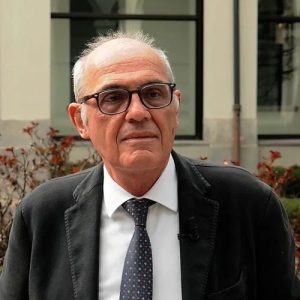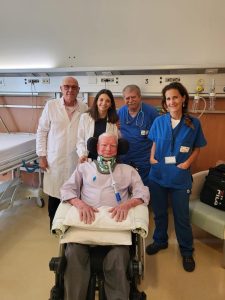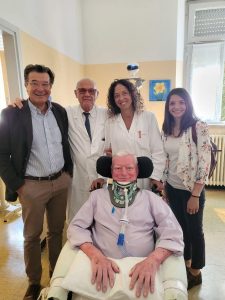Danilo Mazzacane tells us about his career path, which led him from being an ophthalmologist to dealing with special patients: ALS patients
A very interesting path that of Dr Danilo Mazzacane, which has led him from being an ophthalmologist to dealing also with ALS patients, for whom sight is really essential to maintain communicative contact. The case he tells us about is truly representative of how important the approach is that considers the patient a 'person'.
How did you choose your training in Ophthalmology and what is your current professional profile?

My educational and professional background is varied and has always been driven by both curiosity in the medical-scientific field and the desire to achieve something positive in the field of ophthalmology and healthcare. I graduated in Medicine and Surgery and specialised in Ophthalmology at the University of Pavia. After a brief interlude, dedicated to research as a research fellow at the IRCCS Policlinico San Matteo in Pavia, I started working as an outpatient specialist in the ophthalmology branch, which allowed me to realise the importance of the need for a good communication relationship with patients and the importance of collaboration with other medical figures, both territorial and hospital-based, not only in the ophthalmology field. A strong spirit of adventure led me to undertake the activity of union leader, for more than twenty years, with the intention of improving the role and function of doctors within the NHS, with a particular focus on territorial medicine and the health of the patient-person.
At the same time, I embarked on a path in ophthalmology that allowed me to sit on the boards of several scientific societies, and together with a handful of daredevils even went so far as to found GOALscientific society representing outpatient ophthalmologists.
This allowed me not only to actively participate in scientific events, but also to organise them. At the same time, in order to implement contacts and collaborations, I joined the Board of Directors of the Order of Physicians of Milan, the Board of Directors of the Defence Commission Vista and I undertook collaborations with several medical-scientific newspapers. Having retired from the SSN, always motivated by the desire to deal with new situations and areas, I embarked on professional collaboration with a private healthcare facility with religious conventions and one dedicated to treating ALS patients.
My new professional experience as a consultant ophthalmologist at NEMO Lab has enabled me to get to know the ALS (Amyotrophic Lateral Sclerosis) and the reality of life for ALS patients. Everything is aimed at trying to ensure the best quality of life for these ALS sufferers.
My approach with ALS patients was not easy because I was faced with a horizon of suffering that I had heard about but had no direct knowledge of. The eye examination in people with ALS is often much more complex than usual. It requires a special effort in the way of communication and understanding of their needs, with the search for possible solutions.
In more advanced stages of the disease the ocular pointing is the last movement that allows people with ALS to communicate. Therefore, impairment of visual function prevents them from relating to the outside world.
Can you tell us about an unusual or particularly complex clinical case that you managed to handle and solve?
 During my professional presence at the NEMO Lab, a patient with advanced ALS came for observation from the NEMO Clinical Centre, but in full possession of his cognitive abilities and excellently assisted by his wife and son in their roles as caregivers.
During my professional presence at the NEMO Lab, a patient with advanced ALS came for observation from the NEMO Clinical Centre, but in full possession of his cognitive abilities and excellently assisted by his wife and son in their roles as caregivers.
Unfortunately, at the eye examination I found advanced cataracts in both eyes that significantly limited visual function, making surgery the only solution.
The complexity lay in the organisation of the surgical approach, bringing together the skills of a multi-professional team.
I first proceeded to check with the medical specialists at the NEMO Centre that the patient's general condition was such that he was fit for surgery.
Subsequently, I sought and received the availability of fellow ophthalmic surgeons at the Ambrosiana Clinic of the Fondazione Sacra Famiglia, a private healthcare facility with specific expertise in the care of people with disabilities, to which I am a consultant.
 The ALS sufferer underwent surgery for cataracts in both eyes within three months, regained visual capacity and resumed using alternative communication systems.
The ALS sufferer underwent surgery for cataracts in both eyes within three months, regained visual capacity and resumed using alternative communication systems.
The surgeries performed did not present any pre- and post-operative problems, thanks also to the professional competence of the ophthalmologist surgeon and the anaesthesia assistance, but they did require more time than usual due to the positioning manoeuvres on the operating table and the necessary monitoring of vital parameters.
The extraordinary care provided by the nursing staff also made it easier.
Therefore, for a pathology as complex as ALS, which has a major impact on a person's life and his or her system of relationships, we have succeeded through 'taking care' in preserving the patient's visual health, paying attention to those aspects of daily life that guarantee his or her dignity.
A few tips for young colleagues starting out in Ophthalmology.
To the newly appointed ophthalmologist colleagues, I suggest that they approach the profession by always devoting adequate space to professional development, even with some experience abroad, to always set themselves a goal to achieve, to have a free-thinking spirit, to enter into the order of ideas of working in teams with colleagues from other specialities and with other healthcare professionals.
Finally, I would recommend that one should also be guided in one's professional activity by one's heart, thus achieving the best empathic approach with the patient-person. The degree of personal satisfaction will always be immeasurable and will act as a propellant for professional growth also in terms of career.
Under the heading "I tell you a story..."
- "The more I like doing something..." - Italian ophthalmologist
Interview with Dr Silvio Zagari
- 'Give a woman the appropriate opportunities and...' - Italian Ophthalmologist
Interview with Dr Manuela D'Aquino - Open up to the world!!! - Italian Ophthalmologist
Interview with Dr Miguel Rechichi - Every clinical case: an opportunity for growth - Oculista Italiano
Interview with Dr Marco Zagari - The 'allologist' is a thing of the past - Oculista Italiano
Interview with Dr Francesco Cerbella - Broadening our views - Oculista Italiano
Interview with Dr Pasquale Napolitano - Basic skills in each subspeciality - Oculista Italiano
Interview with Dr Beatrice Tombolini
- The privilege of caring for people - Oculista Italiano
Interview with Dr Giovanni Scandura - "Travelling a lot to learn... - Oculista Italiano
Interview with Dr Federica Fossataro - The best refractive solution for each individual patient - Oculista Italiano
Interview Dr. Antonio Randazzo
Editorial info
Our column is open to all ophthalmologists who are interested in telling their colleagues and our web audience about a clinical case.
We invite anyone wishing to participate in our publishing project to contact
Editorial Board 'l'Oculista italiano' - Ada Puglisi
Tel. +39 095 79.22.145
E-mail: info@oculistaitaliano.it
Or write to us using one of our contact forms
